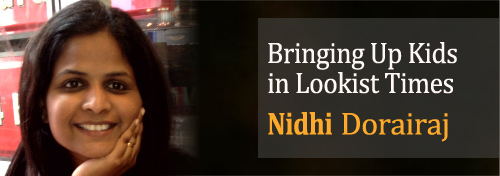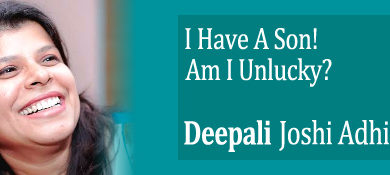Bringing Up Kids in Lookist Times
A recent study has brought to light the startling fact that children as young as three discriminate against overweight peers. Eating disorders are getting more and more common among children younger than ten. Children are more aware and bothered about their looks and fitting in than ever before. We are in the midst of lookist times, where children have to contend with much more than just the everyday pains of growing up.
Have you been in the aisles of a toy store lately? Seen the dress up dolls with their matching make up kits? Or watched seemingly innocent cartoon programmes where the girls are referred to as ‘pretty’ and ‘cute’ whereas the overweight characters are often portrayed as rather dull and unaccomplished? The environment today is rife with such cues for children, which make it appear ok to judge people by the way they look or dress.
What are we as parents supposed to do to stop this from happening, given the fact that our range of influence keeps getting restricted as they grow older and more independent in their choices? Here are a few strategies that may help:
1. Watch your own language cues
Many a times we are the ones who start this obsession with looks inadvertently at home. We talk about how a particular movie actor looks, how fat we have gotten, and openly rue about not being as fit as XYZ. These seemingly innocent comments will regardless seep into your child’s mind and make them start slotting the world in terms of physical appearances.
2. What influences you?
Do you go buy an outfit just because it is similar to the one worn by a cine icon/ friend/ foe? Do you find yourself following fashion trends feverishly? It is not that following trends and aping celebrity couture is bad. But you must remember that your tastes and influences have evolved over the years, you follow somebody because of certain reasons, most importantly – you are an adult. However in the case of children blindly following a trend or way of dressing may not be a logical progression. They might end up doing it just because they see others around them doing it. And it is more likely up happen if they see you doing it in your own life.
So, the bottom line is that your children mirror your behaviour and your choices up to a large extent, which makes it important to model your behaviour for them. And if possible, explain to them why you make the choices that you do. Only if they see that you are not easily influenced will they learn that they can do the same.
3. Monitor TV and other media
This is probably the most difficult thing for us to do. When one says media it extends to way beyond the influence of television. Kids today are exposed to a whole lot of influences ranging from TV to Internet to video games. Though it may seem like a herculean task to separate the chaff from the wheat it is not that there is no appropriate programming available at all. For a while, we in India were lucky to have ad free and age appropriate programming in the form of CBeebies. However with that gone, we can choose to show our children DVDs which have suitable content instead of them getting fed inane dubbed programming from Japan. There is also a website – http://www.commonsensemedia.org/ that reviews child appropriate programming across platforms. Keep looking around and what you may find might help you breathe easier.
4. Don’t give in too easily
It may be easier to let your child have an inappropriate toy (‘What difference will one Barbie lipstick make? After all its organic!’) than to launch into a huge war of words in the toy shop, but it may cost you more than the price of the toy.
Take a deep breath and always allow yourself enough time to remember what is more important in the long run. Immediate skirmishes won’t look too daunting that way!
You may be wondering that all this is much ado about little, but I do believe that children today are getting burdened by much more than they can handle – physically and emotionally. And if we allow them to be easily influenced even in childhood – what sort of adults are we hoping them to turn into? Do you agree or disagree – would love to know.
Nidhi Dorairaj Bruce is a Freelance writer from Mumbai. With no formal education in Parenting, she has been getting on-the-job training ever since her daughter, affectionately referred to as ‘the kidlet’, arrived on the scene 5 years ago. On Twitter, you can connect with Nidhi @typewritermom

